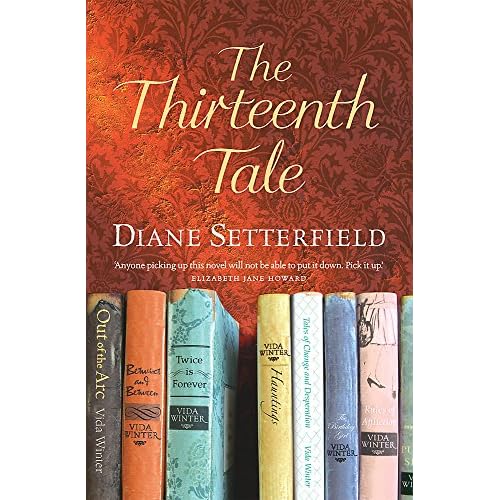
I kept reading accounts of this book, very Bronte-esque was the most common adjective. Not suprising as the author Diane Setterfield bludgeons you over the head with "Jane Eyre" the book, all the way through the novel. The narrative, I feel, could have been immeasurably improved if one of the characters had in fact been bludgeoned over the head with it.
As my sour introduction may have alerted you, I did not like this book. Both the two principal characters Margaret Lea and Vida Winter, were unsympathetic, unrealistic and just plain dull. Margaret lives above and works in her father's bookshop. She is a shy and quiet woman, content to potter about the book shop, feed the crusts of her sandwiches to the ducks and read in her spare time; she also writes the small biographies of barely known personages and her drink of choice is cocoa. The publication of her small biographies brings her to the attention of famous Vida Winter, a reclusive author renowned for her many successful novels and is also infamous for never telling the truth about her life, now dying she decides that her life story must be told and chooses Margaret to write it for her.
Margaret is one half of a pair of twins, her sister having died shortly after her birth, she feels the loss of her sister keenly and pines for her. She becomes interested in Vida Winter's tale when her letter of introduction mentions that her story is about twins. So Margaret travels and stays with Vida in her gothic mansion of a house and writes down the story that Vida tells her...
The book is written well, but the characters were so unlikeable and unrealistic. At one point we are introduced to a hulking character, who it transpires bakes cakes for a living and is called Aurelius. Yes, quite. Margaret corresponds by letter(!), the period in which this book is set isn't stated, but if it is set in the present, surely Margaret would have used a computer at some time in her life. Also if the book is set in the present day, then the governess in Vida's childhood is about thirty years out of date and thirty years out of her time. Did governesses roam the world just after the turn of the century?
The constant reiteration of "Jane Eyre" in the novel was a mistake, intelligent readers could have figured that out by themselves and in any case, I felt that the tone of the book was far too heavy handed at the best of times. The book was well plotted and I suppose successful in that, I was just too annoyed at lazy characterisation of Margaret and Vida. Margaret is a plain mousy woman (remind you of any one?) and Vida appears to be a caricature of Barbara Cartland; as a Rochester figure, she is sorely lacking. There are no strong male figures in the book, apart from kindly John, the gardener in Vida's story.
When taken ill, Margaret is asked if she has read much Austen and Bronte, when she replies yes, the doctor tells her that she is afflicted with the same nervous malady that the women (in the novels) succumbed (which appears to have been being female) and she should read some Conan Doyle to restore her spirits. As Margaret has never read any Conan Doyle, she is hardly a worthy bibliophile is she. I have read both Austen and Bronte and I have never taken it into my head to lay in bed with the vapours. By the doctor's logic, I who have devoured many a story about Sherlock Holmes should now be either, a raving criminal hellbent on murdering my way around the South of England, or a cocaine injecting supersleuth. Or maybe I could be both, eh doctor?
The tone of the novel was strained to be gothic and suspenseful, some passages did have a real ring of muffled menace, but in my opinion, the book wasn't a patch on any Bronte novel and despite the author's undoubted love for Bronte, she has tried to write an homage and not entirely succeeded.
If you have read the book, please let me know what you thought of it, if you haven't read it, I haven't given away any major plot points so hopefully if you read it, you may enjoy it more than I did.
No comments:
Post a Comment